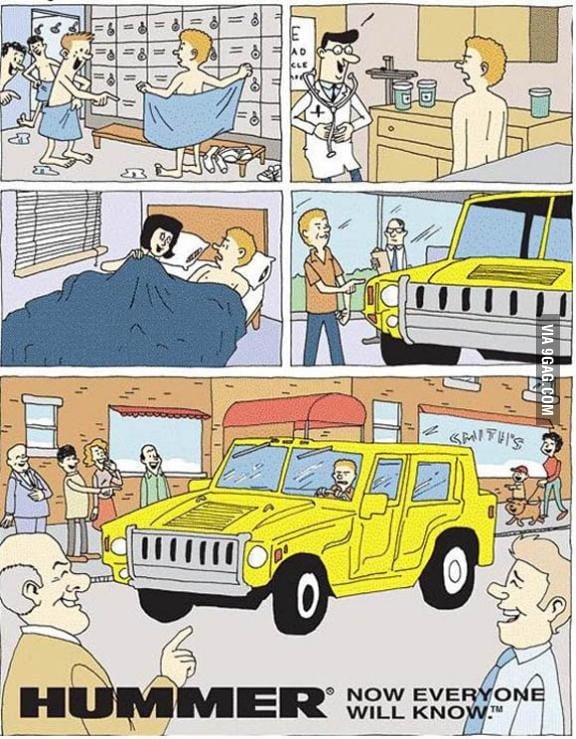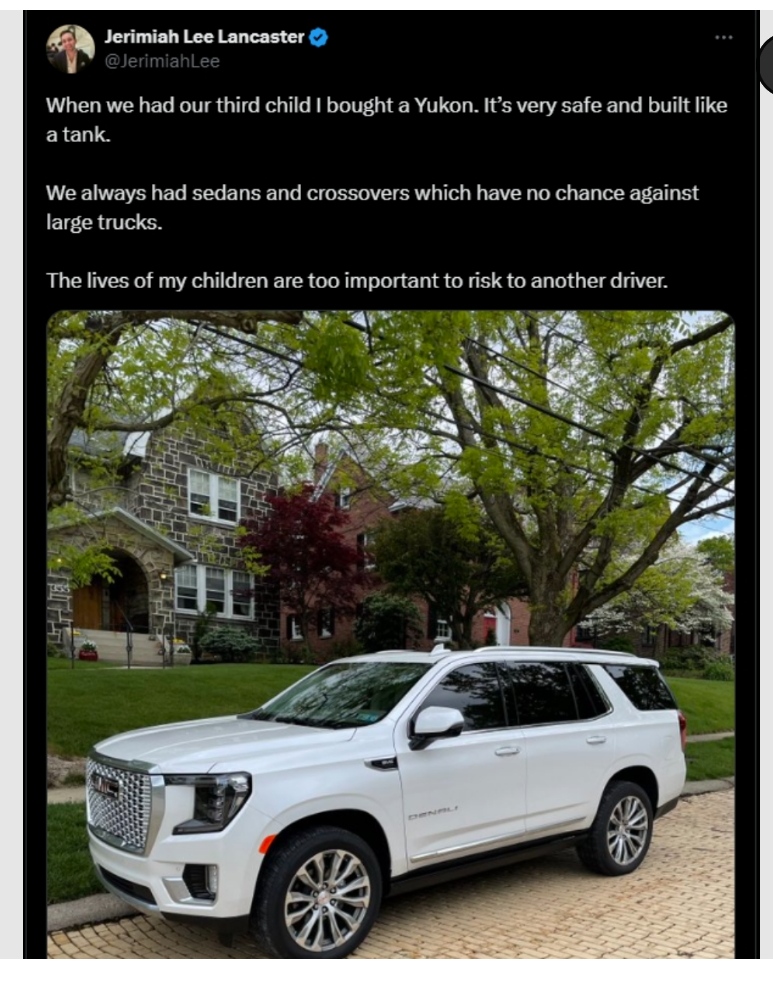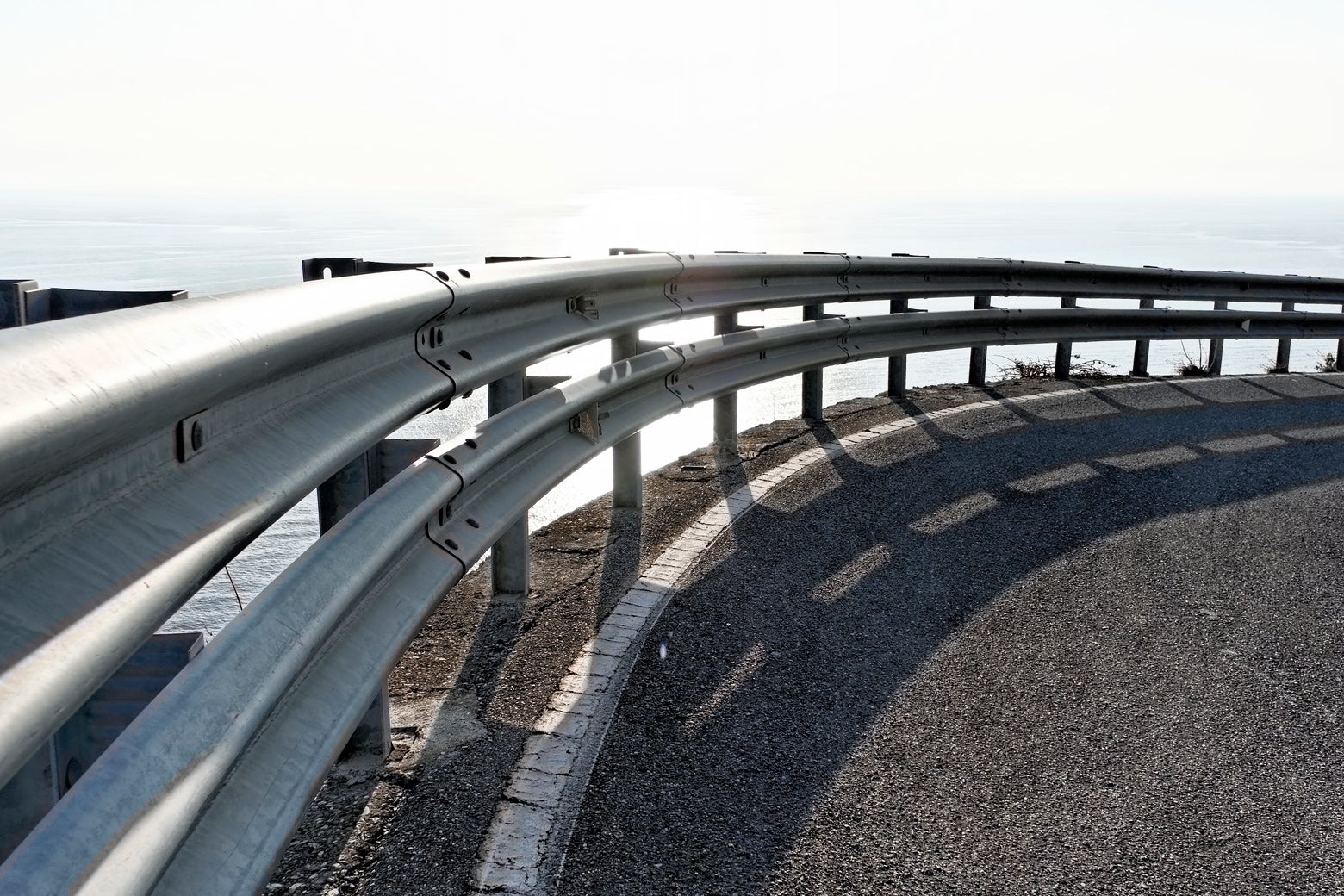There was a discussion a couple of years ago around gasoline taxes and how they are supposed to pay for roadway maintenance. The question came up about EVs. There were discussions about how to include EVs in the taxation system so they would pay for their fair share of the road. One of the options was to impose a tax attached to your vehicle registration based upon the weight of the vehicle. The greater the weight, the more wear and tear it produces on the road surface. This might be one solution to the barrier problem, namely moving the extra cost to the reason for the extra cost.
The “problem” with that tax is that if it’s applied fairly, it gets very big very fast. The damage to the road goes up with weight, but not linearly. Not a square factor, either. Not even cube. It’s to the fourth power.
Start applying that to long haul trucks and the whole industry will be bankrupt in a month. The implication being that we are all subsidizing that industry with taxes on roads. Including that one trucker with a “who is John Galt?” sticker on the back.
That said, this is also a very good argument for improving cargo trains to the point where most long haul trucking goes away.
And frankly, I’m really ok with this.
Trains should be the backbone for shipping. They are WAY more fuel efficient, like 3 to 4x more efficient than shipping by truck. Rail requires far less maintenance. And there’s always the option install a 3rd rail and use electricity instead of fossil fuels to ship.
Speaking of road tax, you know that bad-faith argument about how cyclists need to pay our “fair share?” Well, I would be happy to pay 1¢ for my 10 kg bicycle if everybody with a car had to pay fairly by weight4.
Maybe it’s because I don’t really know anyone passionate on either side of this issue, but I’ve never heard of this argument. I know you said it’s a bad faith argument, but I can’t really imagine what a cyclist’s fair share would be aside from maybe widening a road to add a bike lane lol
You see it a lot on in the comment sections of local newspapers or the city specific subs on Reddit.
Makes sense, that’s where my local NIMBYs hang too.
I heard it on Top Gear.
No reason the tax had to scale exactly to match the damage though. At least make it painful enough so people consider whether a larger vehicle is worth it.
What I’m suggesting is to ramp up the tax on roads over several years in order to pay for the initial outlay on new train infrastructure. Then you don’t need 90% of the trucking industry at all.
Which would be great for many other reasons.
Train infrastructure is being removed around the world - good luck convincing people to build more.
The fact is a train turns one trip into three trips - truck to the railway station, train to another station, truck to the final destination. That often adds days to what otherwise might be a 3 hour delivery - because trains are only cheap if you send about a hundred or so trucks full of cargo on a single trip.
Only really makes sense for really long trips but more and more of those are done by ship or airplane. Trucks aren’t going anywhere.
What if it’s not a larger vehicle, but transitioning from a petrol burning vehicle to an electric vehicle?
We don’t want to give people reasons to hold on to old combustion vehicles any longer than they have to, but the roads of course need to be made safe for passengers and pedestrians and wildlife, I agree.
If they hold on to their existing vehicle than thats just another upside. If they buy a new gasoline car instead of an EV this is bad. But EVs dont have to be insanely heavy if we stop the whole cars getting bigger and bigger and bigger and bigger crap. They will still be heavier than their gasoline counterpart but one solution might be 2 tax brackets: One for gasoline cars and one for evs that has the same taxation levels but allows for, lets say, 500kg more weight in them
So much of that freight should be moved by rail.
Tax based on weight to 4th power would work if we nationalized railways like roads.
Only if rail can figure out their shit and hire enough workers and give them all time off. Too many train derailments from precision scheduled railroading.
Actually maintained rail shouldn’t have this problem, but the private companies like Norfolk Southern spend the minimum amount to keep them operational.
With a budget just a fraction of highway upkeep and expansion they should be able to be kept in good repair.
Why bother with maintenance when the EPA handles the cleanup?
Yeah, I think turning highways back into methods of travel instead of “rolling warehouses saving Walmart a few bucks not storing anything on site” is a good thing.
There’s no need to have the tax be the exact same for every vehicle class. Proper long haul trucks have to be heavy, private cars do not.
The US already has 8 or 10 different vehicle classes defined by weight, the lightest being 6000lbs (which is still ridiculously high, my VW Up is 2200lbs).
Oh well. I guess they’ll just have to go bankrupt then.
And now you starve. None of the stores will stay open long without them.
That should mean they don’t go bankrupt though. If their service is vital, people will pay for it even if the prices rise. It would mean an increase in prices for goods admittedly as the stores try to recoup the increased logistics costs, but intuitively I’d imagine the financial impact on the end customer wouldn’t be as much because they’re paying for the road upkeep either way, just via higher taxes in the current state and via increased prices in the new one.
That’s not a supply and demand thing though. There just wouldn’t be product to buy because there’s no way to get it to the stores. It’s less about the bankruptcy and more about availability.
I mean the supply and demand for the trucking companies. Shipping is a vital service, if it had high taxes, it would have to dramatically increase prices for their shipping service, but they shouldn’t go out of business because everyone else would still pay those dramatically high prices, because they’d have to
Think of the shareholders!
Long haul trucking shouldn’t exist.
As a truck driver, I would like to ask, how would you acquire all the “stuff” you have bought over the years? I am reasonably sure most of it was not produced locally to you. And the raw materials almost certainly aren’t locally sourced. Trucking and logistics generally has its issues, and you only have glimpsed a fraction of them, but it is absolutely necessary for modern society. Unless you’re proposing we kill off 2/3rds of humanity and go back to hunter-gatherer. Not a fan of that idea.
He’s proposing trains should do the ‘Long Haul’ portion.
Which have their own issues. Namely, to my knowledge, upfront cost and lack of flexibility. I’m sure there are others.
Here in the US, you are unlikely to find enough people willing to think far enough ahead for that to happen. Too many emotions guiding actions.
The cost has already been paid. Even small farming communities have rail line access that’s mostly been abandoned because the line owners switched business models.
As for flexibility, again, that’s mostly an issue with how rail line management has evolved. From shorter more frequent trains to ultra long infrequent trains. Mostly to cut the cost of staffing.
The solution is simple, nationalize the rail service. Put it under the USPS and have them figure out scheduling to optimize the speed of goods shipping.
The current state of the rail system is entirely due to the monopolistic nature of ownership. The incentive is to increase prices as much as possible while shipping to the fewest stops possible. Profit motives are in direct conflict with generalized shipping.
The reason trunking works today is the public nature of roads. Well, why shouldn’t rail lines be equally public? We practically gave the property away to the current rail owners with the notion it was for the public good… They’ve failed that.
But if the true costs were quantized in the formula and not just externalized maybe it would suddenly make more sense. After all, in the end, society pays for it no matter what.
Even if we put 100% of freight on trains, and expand the existing rail network 10x, the need for trucking infrastructure would not decrease by any significant amount. Trains can’t stop at every single business that needs freight, and trucks are still needed to get that freight from the railport to its destination (this is called “last mile” freight, but it can be up to a few hundred miles depending on where the nearest logistics hub is compared to the destination).
By the way, we already use trains significantly. Look up the intermodal logistics network. The general concept is smaller trucks pick up freight from different businesses, consolidate it in a single warehouse, then the freight gets put on full size trucks to move to the nearest railport and the trailer is loaded on a train which carries it as far as possible, then the reverse happens at the other end. The vast majority of freight movement uses this method.
You’ve moved away from the part which specifies long-haul trucking. To my understanding this is an area where trains are a reasonable solution.
Last mile coverage we also have room for improvement with much smaller vehicles, like bikes.
My point is that long haul is a very small minority of long-distance freight. Anything that can fly, does. Anything else will go on a train if a route exists (this is where rail expansion would help, but there are other problems with that we won’t address). The only freight that travels long-distance is truckloads that can’t fly (hazardous goods that are dangerous to put on a plane, or stuff like certain foods that could be damaged by the pressure changes in flight) AND doesn’t have a good train route to take. My cross-country routes were always stuff like fresh produce or other foods that would be damaged by the pressure. Everything else would travel a few states, but never from one coast to the other.
And you can’t put 3 full pallets on a bike, you’ll always need trucks to some extent.
Neither should lots of short haul trucking, more specifically drayage trucking, that industry sucks. We probably need to move more towards vans and stuff.
In Australia (and I assume other similar countries) trucks have tax concessions to avoid the cost of food fluctuating too much with the cost of diesel. This tax doesn’t need to be any different.
So? That money is still coming from somewhere. If the freight industry can’t afford to pay then it means we are subsiding them CURRENTLY. They by the very nature of capitalism deserve to go out of business
True but unfettered capitalism is a terrible model.
If you look down further, I’m just saying you can’t deal with the problem in this specific way.
To be fair, it’s the fourth power of the axle weight, not vehicle weight. So it’s not as extreme for long haul trucks as you make it sound, but still much higher than for a car
Trucks already pay a lot more in tax and regulatory expenses. In my state, annual car registration is $30-ish. Annual registration for a full-sized 18-wheeler is $1350 for the truck and $30-300 for each trailer. They also have to pay annual fees at the federal level which can be $600+/year, and an additional fuel tax on top of the existing state sales tax on diesel which I don’t know the rate of right now. All of that applies to every single power unit and trailer in a fleet.
Trucks should be taxed much higher than cars, but too many people don’t know or just don’t care that this is already the case, and it has been this way since the 1940s.
They are taxed a lot. Are they taxed to the fourth power of axel weight? Not even close.
deleted by creator
I think you make want to go the other way. Making tires more expensive wont make people choose smaller cars, they will choose worse tires. And then they will crash into you because they cant stop.
It’s a good rule not to make essential safety items more expensive. Because consumers in general will always choose a cheaper, less safe option.
yeah if anything a subsidy for safer tires and doing proper maintenance on brakes and other safety system would be what you want.
what is subsidized, there is more of than there otherwise would be
and the opposite is true for what is taxed.
They’ll still have to replace them more often or won’t be able to drive their vehicles or pass a state inspection to get their annual registration completed unless their car is road-worthy, thus costing them more money in tickets and remedies of said ticket.
Sure, but the problem is that you dont want to make safety equipment more expensive, as it encourages cheaping out and cutting corners. People already buy cheap and nasty tires that dont grip well or stop well (but still meet roadworthiness), its best to avoid further encouraging that.
There is no reason not to just directly tax against the weight of the car, as defined by the manufacturer. There already is a yearly rego payments, just scale that directly against weight.
A direct tax is also clear and obvious. If someone has a large car, the rego weight tax will clearly show they are paying more. Making tires more expensive just gets rolled into the price of the tire, which are already moderately expensive, so its easier to just rationalise it and ignore it.
Sorry, the tax is a great idea but taxing the tires is a terrible idea.
I think he is close though with his initial train of thought. I remember doing some research on this many years ago and road wear does not scale linearly with weight. All other variables being equal a 1,000lb load going across a stretch of road 10 times does less damage than a 10,000 pounds load going across the same stretch once. So what we should really be doing is looking at semi trucks and the heaviest of consumer vehicles. It would theoretically make consumer goods go up in price a little, but it’s not like that cost isn’t already being paid/subsidized by consumers in other ways.
Maybe it would even push the use of railroads for goods even more than it is used now.
Why is it a terrible idea?
Taking a guess, but it would lead to people replacing their tires less often, making cars more prone to accidents, and thus probably being counterproductive and more dangerous.
It should be linked to what a driver has to do (e.g. registration) so they can’t try to minimize the cost by delaying it, especially with maintenance.
Tire inspection is still part of vehicle registration inspections. You can’t delay more than a year, and states can always require a tire change within a certain % of being totally worn out if having tires within x-% is showing evidence of causing more accidents.
Unless the argument is that any additional cost will prevent people from performing maintenance. Like, “gas prices can’t go up because people will stop buying gas”. Or “if you make registration more complicated, people won’t register their cars”.
Taxes in the US also have a precedence of decreasing as you get into higher values. There is nothing saying taxes can’t be a higher % on low quality tires. Buy a better tire that last longer, lower percentage tax tier. The point of taxation is to deter behavior you don’t want while recouping the cost of operation over time. Cheap tires that only last 1k miles can be taxed at a much higher % than those rated at 50 or 100k miles. We do that shit all the time.
Not all states have regular inspection requirements. Some are only every couple of years. But even if they did all implement something, you still would be encouraging people to wait in until the last possible moment to do it, which might decrease the amount it increases the risk, but it would still do so.
For the same reasons others have said. Don’t increase the cost of safety equipment.
There was a discussion a couple of years ago around gasoline taxes and how they are supposed to pay for roadway maintenance.
I just want to point out, even if they’re supposed to, gas taxes do not pay for roadway maintenance, not by a long shot
Some states do exactly that, or did back in the day. 30-years ago in Oklahoma, an old 2-ton dump truck with an antique plate was $20, a new Corvette $600. I think Texas flipped that and charged by weight vs. value.
ah yes, another anti-environment tax. More barriers to fossil-fuel free adoption. As you would expect, Mississippi already has this tax. Don’t be like Mississippi.
Then add some exceptions to cars that aren’t as bad for the environment like electric cars.
Maybe exclude batteries for the weight calculation.
It isn’t a hard problem to solve.
Wouldn’t be anti-environmental… it would be for all vehicles including ICE and commercial, as well.
And the heavy vehicles get classified as light cargo so are largely exempt from those taxes. They’re promoting and building heavy “cargo” vehicles specifically because they get exemptions for fuel efficiency and taxes (depending on location).
In the country I reside, everyone pays for the roads through income tax. Vehicle owners pay emissions tax. I think this is fair since everyone relies on the roads even if they never travel down a road themselves.
You can still tax large vehicles, because everyone bears the cost of having them around.
Not everbody “consumes” the same. So for consumer products (everything) would be distributed better if the price was in the product price itself. Along with it being included in the price of transfer services etc.
Come April, NZ will be charging EVs road user charges using the same price-per-kilometre mechanism diesel (diesel not have a fuel levy) vehicles use.
An alternative idea that I mentioned on a thread yesterday about vehicles with high bumpers, adjust the license class system to be more strict regarding vehicles. You already have to have extra training in a different license to run transport vehicles or semi trucks you should have to do the same with large vehicles, I’m not saying ban every pickup truck out there because I fully agree that trucks are a hard requirement especially in snow covered States like mine but there is a difference between having a pickup truck and having a monster truck at least in my opinion heavier or taller than low end transport vehicles
Agreed, there’s also plenty of people who think that just because they have a large vehicle, that they’re immune to the snow. Obviously there’s a quantity of snow that trucks are more necessary for, but I’ll admit to feeling a bit smug when I see ditches full of abandoned trucks and SUVs, as I drive by in my little front wheel drive sedan.
A more logical way would be to tax a car based on how many km/miles it travels in a year, at least partially.
I bet that my 1.5 tons car travelling 10.000 Km/year ruins the street a lot less than my neighbor’s 1 tons car that travel 30.000 Km/year
Every mile an EV drives is already taxed as we already tax electricity consumption. There is no reason to add a tax for something already taxed.
That depends on if the tax is sufficient to cover the societal costs of driving that mile or not. Not every use of electricity degrades public infrastructure to the same extent, so if the maintenance burden an EV adds is more than what the electricity tax brings in, then additional taxes to make up the difference would make sense.
That is true also for fossil-fuel
Yeah well let’s quit making 7000 pound consumer vehicles. Small EVs would be more efficient and better for the environment because they need less materials to build and and less energy to recharge.
Judging by the general trend I don’t think this is happening anytime soon. The overall car industry is obsessed with even bigger cars.
And even in Europe it is sickening to see those half buses on our roads. And this is especially true for big cities, where parking space is very limited and usually those cars occupy park space for 1.5-2 cars.
And knowing that the fertility rate is really going down I wonder what justifies those cars.
There was once a legend about vehicle’s size and … Well…

That’s because the USA subsidizes bigger trucks as “work vehicles”. This practice needs to stop and they need to be taxed more than smaller vehicles.
State vehicle registration where I’m at is based on vehicle weight. Costs about $400 to renew the registration on my daily driver and $600 to renew for a larger truck. Motorcycles are only like $80 to renew.
Consumers are being taxed more for larger vehicles, it’s the manufacturers trying to avoid safety regulations that are seeing the cost benefits.
That’s because the USA subsidizes bigger trucks as “work vehicles”.
Can you cite this? Don’t get me wrong, I understand that if it’s actually a work vehicle you probably get some tax credits/breaks, but I highly doubt many consumers are getting these breaks for buying large vehicles.
https://youtu.be/jN7mSXMruEo?feature=shared
Not op, but I really liked this video, as it explains quite a bit. It is of course a biased video, but still…
Here is an alternative Piped link(s):
https://piped.video/jN7mSXMruEo?feature=shared
Piped is a privacy-respecting open-source alternative frontend to YouTube.
I’m open-source; check me out at GitHub.
I watched most of the video, it’s primarily about safety. It’s says the growth is mainly due to the regulations not applying the same to light trucks, which SUVs are classified as. This seems to contradict the claim that I was asking about.
If there is something about the state subsidizing the vehicles and I missed it, I would appreciate a time stamp. Noone needs to convince me that suvs are unsafe and an environmental disaster.
In the US it is called the 179 deduction. For trucks over 6, 000 lb gross vehicle weight you can deduct the total price for the year the truck is put in service.
Thanks for the citation, I’ll look into it.
In Australia it breaks down thusly. (for reference average wage is about $80k per annum).
If you buy a vehicle for $50k, you’re entitled to claim a tax deduction for that cost, usually spread over a number of years.
However, if you buy a vehicle for $100k, you’re only entitled to claim a tax deduction for the first ~$56k (changes each year), unless the vehicle has a large enough carrying capacity that it can be considered to have been designed for the purpose of carrying stuff rather than people.
This rule is designed to disallow deductions for wanky vehicles. Like why should someone be allowed a deduction for driving a wanky mercedes SLK when a cheap and chearful toyota camry can perform the same task of moving a taxpayer from point A to point B. Of course, if someone buys a $300k prime mover (tractor?) designed for hauling 90 tonnes of wheat from a farm to a port, it’s just not possible to do that with a toyota camry so you should be entitled to claim the entire cost.
Suppose you have 2 vehicles, both costing $100k, one is a regular sized Toyota truck, and the other is a ridiculous RAM truck or something. Suppose you plan to sell whichever you buy, after 8 years or so, when it’s value is $50k.
On the Toyota you can only claim a tax deduction on the $6k difference between the $56k notional purchase price and the $50k sale price, which if your tax rate is about a third then you save yourself $2k in tax, so the vehicle cost you $48k to own for 8 years.
On the RAM you can claim a tax deduction on the entire $50k difference between the $100k purchase price and the $50k sale price. A third of that is ~$16k, so it only cost you $34k to own that vehicle for 8 years.
I’m guessing you don’t actually pay attention to the tax law, then. Annual vehicle registration (aka, a vehicle ownership tax) is more expensive as the weight on the vehicle goes up. Vehicles over a certain weight limit require more complex and strict drivers license classes (granted, class B starts at 26,001 lbs which is way higher than even today’s heaviest consumer cars), and any vehicle used for work has higher insurance and regulatory costs, regardless of the size.
Buying an F350 (a truck that really only has a place in very specific situations anyway) requires so much extra work and almost always requires a class B license because of the kind of work being done with it. People who choose to get something like that because of small-dick syndrome are idiots. And that’s coming from a person who used to drive 18-wheelers and still has a compact SUV as my daily driver.
Yeah because emission standards are based on size and weight. So why spend the money making environmentally effective equipment when you can just make everything bigger and still rake in money?
The EPA under the Obama admistration enabled this. I was surprised to learn this. It needs to change. I think trains need to change too.
Congratulations, the fossil fuel industry just put a hit on you
Small PHEV’s would be ideal for the current generation. Battery advances will come, but we should always try to optimize with the current technology and 10 cars with a 10th the battery of a Tesla would be better for the future.
I do want to see more efficient, smaller EVs, but no one wants an EV that only gets 50 miles per charge. They aren’t worth producing from the manufacturer’s perspective.
My 2016 Nissan Leaf is 4400lbs, which is more than my larger (but still not that big) 2016 Mazda CX-5 at ~3500lbs. Both manage to fit my family of 5, but the Leaf is far less accommodating and it weighs a good deal more. Small EVs are still pretty substantial. A Kia EV6 which is roughly the same size as my CX-5 weighs 5500lbs. You add a lot to a vehicle when you add an EV battery.
Yeah but I’d like to visit my family and the nearest charging station is halfway across the state
Your house is halfway across the state?
Many people live halfway across the state from their family.
I live in Wyoming, people not from here have a hard time understanding how desolate it is here. If I were to switch to an EV I’d have to take a plane everytime I wanted to visit my elderly mother, who would send a cousin in her ancient f-250 to drive me around, because there isn’t a single electric charger in that QUARTER of the state
Could be a student or military or live in an apartment.
Not sure any of those establishments are going to be thrilled with you running an extension cable across the parking lot or sidewalk to charge your car.
Also pretty sure they meant their family lives outside of the range of a single EV charge and there’s no charging infrastructure on the way. What would be an 8 hour drive to visit family for the holidays turns into a multi-day trip with a stay at a motel/hotel to wait for your car to charge.
If you are unable to find a charging station at some point halfway across the state you’re either being too picky, or blind. I live in the middle of nowhere Maine and I can still find at least one electric vehicle charger per major town. Hell there is three of them in the town next over and it’s not even considered one of our highly populated towns. I thought the same that you did until I actually looked up where charging stations are located I was pleasantly surprized
I live in Wyoming, having been to Maine, yall have an amazing and beautiful state but your definition of bumfuck no where is lacking. I checked the EV map again the ENTIRE QUATER of the state I live in that doesn’t have a single charger is where my family lives. I down south near Colorado for reasons I don’t want to get into right now but I want to be able to actually visit my family without having to take a plane between the two airports in Wyoming.
yea looking at wyoming I can see there is defo a lack of EV stations, it looks like for southern wyoming the longest stretch is between rock springs and Lareme, but that’s mostly if you lack the ability to use super chargers. I can see how it would be a pain to use an EV in that case, doable but it would stretch it a little further than i would be comfortable with as well. That being said you would never catch me driving 3 hours one way to visit someone anyway lmao
Ehh 3 hours isn’t that bad, just means the trip back happens the next day or you’re dropping in to say hi while passing through town.
Plus, it’s Wyoming. Famously the least densely populated state. That comes with some associated costs.
The benefits are great though, people leave you alone and living here is cheap
Couldn’t pay me to live that far from an ocean. Or good internet.
Lighter vehicles should be able to have the same range as larger ones, just have to find the right battery/weight/range combination.
Yeah the current weight/range/battery combo for me in my almost entirely rural state is an ICE vehicle as much as I like EVs they just can’t get me where I need to be with the current infrastructure. Unfortunately my attempts is also revoking its green energy tax stuff, got to love Republicans. But at least we got rare earth metals now, so that means nothing has to change! (God I love my state but hate the people running it)
Without doxing myself, from my hometown the nearest charging station is 30 miles away, that’s not end of the world far its definitely feasible but its not good enough. Especially when there’s gas stations everywhere. Charging stations need to be in way more places outside cities before they become appealing to folks living outside built up areas.
Nearest one to my hometown is about 3-4 hours out. I would have to take a plane and have a cousin come get me in her truck whenever I visited my family if I used an EV the tech has come a long way but the infrastructure just isn’t always there as much as I hate that
Tldr most guard rails are designed to stop vehicles under 5000lbs. Passenger vehicles are starting to exceed that, and EVs can weight 30% more than ICE vehicles.
How about keeping the guard rails as they are and let the fat car drivers carry the risk?
Even US drivers are not quite heavy enough to make a significant difference here. This has to do with car battery weights.
I don’t think they are saying that the drivers are fat. Or at least it would be insane to say that society shouldn’t care about the safety of fat people.
It’s more likely that they said that the cars are fat which they are.
Fat car can hit an innocent skinny car on the other side of the road, in case of an accident.
The problem is if they crash through the guard rail and kill or Injure others.
What about trying to reduce deaths?
That’s 3175 kg for non-free folk. My car has around 1600 kg. 7k pound car is a fat fat cow.
People are saying “it’s all the electric cars and batteries…”
Yeah my VW ID4 which is a pretty decent sized electric car is 2003kg. You are looking at giant electric SUVs or electric trucks to get over that 3175kg. Even the cybertruck is only 3k and that is just a giant chunk of steel and battery. They must be including hauling weight in that…
Swifts and Mirages can be under 900kg.
It’s the battery, and the support frame to carry the weight of the battery safely. Like it or not - cars are getting heavier.
It’s a big fat fucking truck or luxury suv with a battery. A normal sized electric car is a thing too, you know. Electrics will always need to be heavier than ice of same size and model, but that doesn’t mean it needs to weigh 3000kg. Car are growing heavier and bigger not just because of electrification, but because of growing fragile egos and growing fears in a vehicle arms race.
Trucks and SUVs are getting heavier to skirt emissions controls.
In 2010 the Obama administration passed laws tightening emissions control requirements for new vehicles. But the laws were written to allow emissions as a factor of vehicle size, larger vehicles were allowed to have more emissions.
Unfortunately, the plan backfired. Instead of reducing emissions, vehicle manufacturers just started making vehicles bigger.
It isn’t primarily the fragile egos that are driving sales of these vehicular monstrosities. It’s corporate profits and greed. Manufacturers aren’t making smaller models because they don’t make as much money on them, not because there isn’t a market for them.
A little bit, yes. The electric version of my current car is only 200kg heavier. For context, it’s a small, compact city car.
But cars are getting huge in general, EV or not. A current gen VW Polo is bigger than an older VW Golf. All the while the Polo is (still is) the smaller brother of the Golf.The F150 lightening weighs about 6,893 lbs. That’s before you put a load in it. I’d guess a load of pea gravel or similar would push it over that max weight of a guard rail. Hook up a horse trailer to it? Definitely. For the record, the F150 is the best selling consumer vehicle in the US and I doubt that’s going to change too much. I appreciate the people in here saying “not all electric cars”, but there’s absolutely electric vehicles already on the road pretty dangerously close to this max weight. The Rivian truck weighs in at over 7K lbs (7,148 lbs). The Tesla cyber truck weighs in at 6,603 lbs. These vehicles have load space that can accommodate heavy loads. Their curb weight is dangerously close to (or in the case of the Rivian over) the limit that our guard rails can safety buffer.
America has a lot of problems with things like the “Chicken Tax”, and the NHTSA regulating automakers for the purposes of higher mile per gallon vehicles, which has started and continues a trend of making larger and larger vehicles with intent to circumvent those regs and make more profit. The whole system is a bit broken, honestly.
Just get an even bigger car, it will keep you safe from those.
Canyonero!
The country-fried truck endorsed by clowns!
Somehow I hadn’t seen it before. Thanks!
Here is an alternative Piped link(s):
The country-fried truck endorsed by clowns!
Piped is a privacy-respecting open-source alternative frontend to YouTube.
I’m open-source; check me out at GitHub.
I mean… kind of?
10 or 20 years ago? I would never have driven an SUV and thought anyone in one is stupid.
Five or six years ago? I needed a new car and ended up getting a “crossover” (so basically a hatchback on a lift kit). Still tiny compared to a lot of the cars on the road but a lot bigger than what I ever expected to drive.
Because in a sedan (like my rental a few months back)? My head is literally at bumper level for a LOT of the vehicles on the road. And now we have shit like the cybertruck where the bumper is a jagged metal wedge. I have a lot of faith in modern safety specs but that is still terrifying. In my small suv? I am still grill height for a lot of trucks but at least I am not weaving around monster trucks in a clown car.
Don’t get me wrong. I very much enjoy the increased ground clearance and ability to haul an entire car worth of camping gear comfortably. But I also know that I am “never” going to go smaller. And… that is kind of the problem. People are dragged kicking and screaming because the alternative is to feel like you are going to die the next time someone decides they are going to ignore a red light.
I didn’t realize until now, but I’ve been very fortunate to be able to take the bus to work recently, and the lack of fear of other vehicles on the road is probably a huge contributor to how much better I feel after the commute. I have that anxiety ever-present in the back of my mind while driving a sedan.
That it’s a arms race doesn’t make it better for society as a whole. It sucks.
Agreed.
But also? I care a lot more about me and my loved ones than a nebulous “society”. And I am not going to drastically increase risk to me and my partner in the interest of standing on principle*. Especially when “society” continues to get giant pickup trucks on lift kits with fucking spikes for bumpers.
*: Although, I WILL be one of those weirdos who does a LOT of research on fuel economy and efficiency so that I can feel better about technically driving an SUV.
It’s honestly ridiculous. My sedan was totaled last year after being rear ended at a red light at maybe 5mph by a big fuck off truck. Minor cosmetic damage to their bumper, completely crushed the rear frame of my cat.
Thankfully, no one was hurt beyond bruising, which is the most important part.
Part of that is by design and is crumple zones. EVERYONE makes fun of “whiplash” but people really do underestimate the kind of injuries caused by even a simple rear ending. And if your car got that fucked, it was probably for a good reason.
Of course, then we also have assholes who want cars without crumple zones to drastically increase damage to other vehicles. But… yeah.
I’m aware, and I’m more than happy to trade my car for my neck in any situation.
The issue is the proliferation of big fuckoff trucks. Had it been another reasonably sized car, it likely would have been a simple bumper replacement for both cars. Instead, I’m out a car for a significant period of time in an area where doing anything without a car is essentially just not a thing.
Car bumpers are usually able to take a 5-10 mph crash without more than cosmetic damage. But that’s only if the bumpers hit each other. The fuckoff huge trucks have their bumpers up where the tailgate is, which will crumple the lid an maybe fuck up your frame which can total a car even in a light impact
I’m of the opinion that putting small cars way up in the air as CUVs ruins the driving so much it makes people worse drivers.
Or maybe it’s just that every CUV I see driving acts like they don’t know where they are or what they’re doing.
Cunt Utility Vehicle???
They claim the C stands for “compact” but I like yours better.
I think that more has to do with the cabin design.
I personally drive a Subaru Crosstrek which is literally a Subaru Imprezza on a lift kit. So I have good visibility and have gotten used to the blind spots that my frame creates and know to lean forward a bit when approach a roundabout or intersection to make sure a car isn’t coming in from the left at approximately the same speed as me. Same with changing lanes on the highway (and knowing that the headrests on my back seat completely block vehicles in my rearview mirror…).
That said, my rental a few months back (it might have been a Camry? I forget) had a HORRIBLE interior and my blindspots felt massive because so much of the frame obstructed my view. Some of it was that I only had two or three days to “get used to it” but the frame genuinely meant I could not see traffic when I was doing tighter merges on the highway. Again, I know that means I physically move in my seat but a lot of people never learn that or are used to “check your blindspot” just meaning looking slightly farther back when glancing at a mirror. So they kind of just start changing lanes and get honked at or suddenly see the vehicle they are about to pit maneuver and need to quickly swerve back.
I think you’re right about that, and I also don’t think car designers actually care anymore. I see all kinds of vehicles with huge C pillars - like that Camry you rented - and a lot of them have dented bumpers like they backed into something they couldn’t see.
Car companies don’t fix the designs, though. They just add more features like BLIS and proximity sensors that beep at you when you’re too close to something. This helps, sure, but it also reinforces the idea that drivers don’t need to actually look around them.
With our aging population, we’ll have even more people who can’t physically turn to see what’s around them. And because these folks also have trouble getting into and out of cars of normal height, they buy CUVs which have even worse visibility.
I definitely agree that automakers are trying to replace “ability” with technology. I know that I very much rely on adaptive cruise control at this point (although, I was pleased to realize I can still maintain speed without it). And while I think that is mostly about safety, I also know I have swapped out my sunglasses or grabbed a beverage in ways I never would have fifteen years ago.
But also? A lot of the cabin stuff is about safety. When your driver’s side window is at bumper height, you can’t really rely on that glass to do much at all. So you need to make sure the frame can take an impact. Which means thicker metal, more airbags, etc. Which means thicker pillars and worse visibility.
Which gets back to the original point: Yeah… you kind of do need bigger (or tankier) cars to survive on the road these days.
You seem ambivalent about the topic. I understand your arguments, but I don’t agree with your solution. That doesn’t need to bother you. We probably have very different requirements for transportation.
I live in an area where I don’t need a car to get where I want to - bike, bus and train are sufficient. And I don’t normally need to transport so much that I need a car. And if I need a car I get a rental for a short time.
Sometimes I shake my head a little in disbelief because I find the trend towards more individual transportation within large cars concerning. But then again my lifestyle isn’t for everyone and who am I to judge? (But I’m entitled to my own opinion. ;)
Extremely few Americans live in a place where that is even possible. Few can afford to move to a place like that because they are so rare and desirable. Your comment is not helpful.
This is also a bugbear for me. Since even in countries with genuinely amazing public transportation (such as Japan), people who live in more rural or remote areas are still up a creek. You might have a bus but you basically have one or two routes per day and if you need to “head into town” at any other time… you need a car.
But there are various youtube channels by rich white people who live in some of the more expensive cities on earth that basically say “fuck the poor” under the guise of better city design. And… don’t get me wrong, living in a city with public transportation is amazing and America as a whole REALLY loves unwalkable towns. But there are always going to be situations where private transportation is needed (even if it a few cars that the entire town “shares”).
some of the more expensive cities on earth that basically say “fuck the poor” under the guise of better city design
You’ve got that backwards.
Those are great cities to live in which is why living there is expensive. Cause those cities can’t accommodate that many people.
The city design isn’t the problem. Scarcity of it is.
It wasn’t meant to deliver a solution. It’s an opinion (as in a piece of my point of view).
It’s just not the right way to go in my opinion. (And yes I understand the reasons why people choose what they choose. )
Same here, drove hatchbacks and sedans until 5 years ago and now have a crossover. It was good for a bit but now these new pickups and SUV headlights are right in my face again. Thinking installing a suspension lift and larger profile tires in the future. I do not want to drive a giant rectangle and can carry extra cargo if needed on my roof rack or cargo basket.
Odd I feel the opposite. I want something small and can change quickly to get me out of danger vs trying to be too big for danger.
I mean… good luck dodging someone who completely ignores a stale red and just floors it through an intersection (almost got jackknifed by one of those dumbasses just last week…) or someone who decides they want to merge into your lane and don’t care that it is “bumper to bumper” on the highway.
Defensive driving is about minimizing the likelihood of a crash while acknowledging some are just unavoidable. Hollywood stunt driving is the idea of being able to swerve into oncoming traffic to avoid getting pti maneuver’d.
That is a valid point.
Your comment reminds me of this:

Context:

haha brilliant
That’s why I get everywhere by bus.
7000 Pounds is 3.2 Tons (metric)
3.2 Tons
geez, i wonder why these guardrails wouldn’t work on a fucking Truck
Simple, if you buy a car that’s too heavy for the existing infrastructure, you either pay for the improved infrastructure or take the risk yourself. The minivan that I drive the kids in is only 4,300 lb. If you’re driving something heavier than that then, best of luck. I expect that if I’m driving a camper, and I fall off the road, I’m just done. Game over.
I don’t expect infrastructure to adapt to the minority. That’s not what it’s for.
what about trucks? should these rails not work for big trucks? or are trucks a minority?
edit: trucks like the ones that transport goods not rednecks
Trucks are commercial vehicles. People driving commercial vehicles should be professionals and we should have required a commercial class c license for all light duty pickup trucks or SUVs. Anything that gets an emissions credit so they can have lower MPG for being a commercial vehicle should also be classed as a commercial vehicle for licensing purposes.
Trucks in America practically doubled in size within the last couple years. Expecting everything to change that quickly is ridiculous. If big trucks stick around then sure, expect infrastructure to become rated for it and also more expensive.
Trucks are driven by people that are supposed to be way better than the average driver. They also would need huge (and expensive) walls. At some point you have to compromise. It’s not feasible to truck-proof the roads.
I don’t think there’s a way to make it work for both cases.
It’s actually important that the rail gives in and deforms, as this reduces a cars energy much more quickly and safely than if it were rigid. Unfortunately this also makes them much less effective for larger vehicles.
In the end, it’s a question of protecting as many people as well as possible.
But muh big truck
The only solution is a bigger truck.
We need to get rid of the commie laws requiring special licensing (CDL, Communist driver’s license) for freedom trucks.
We just need to not have these big ass trucks for the general public. You don’t need a ford 350 with rims jacked up to show you have money. You are a pavement princess.
“But I need it for my work!”
You don’t even have a toolbox on it. If it was an actual work truck, it would be a pickup with the bed replaced with one of those toolbox beds. Or you’d have a sprinter van like the actual plumbers and carpenters around here.
All those tiny penis trucks are so funny, there’s never a single spot of mud or dirt inside the wheel wells, and they put mud tires on to drive around on pavement! It’s like … hmmmmmmmmm what happened to your brain?
Flatbed sprinters are awesome. I saw one with a skid steer on it and towing a trailer.
I’ve never seen one of those, but I believe it! I bet they’re comfy to drive, too.
They have a huge gross vehicle weight for their size and a low bed.
This becomes a self-reinforcing cycle. If there are 7000lb passenger trucks on the highway around my compact car, I maybe start wanting to get a larger vehicle myself to protect myself from the idiots who drive them.
There has to be some sort of incentive either for smaller cars or against larger cars. Currently you can go into a dealer, tell them you want the biggest baddest truck/SUV that they have, and buy it all while having a normal license.
You’d only be paying a slight premium on whatever road or fuel tax if that while having the benefit of not getting destroyed in a car accident. As it stands, there is little reason to buy a larger vehicle unless you actually don’t like driving a car that big.
Easy. Slap on an annual registration fee directly proportional to weight. Shit, just make it half the sale weight of the car for any non-EV, and half that again for EVs. Peg the ratio to inflation after that.
Weight should absolutely be a factor in registration fees. Between road damage, their environmental cost, and danger they pose it’s a no brainer.
Sort of.
It’s either giant trucks, or Subarus.
My first car had a curb weight of 2400 lbs. It’s absurd how fucking huge these planet-destroying, environment destroying, life destroying monstrosities have become.
“The goliath-like GMC Hummer EV weighs a staggering 9,083 pounds, 2 tons more than a gas-guzzling H3.”
I’m confused 'Murica, do you want freedom or not?
Removed by mod
Oooohh yeeeaaaahhhh!!!
Seems like we need some regulation for maximum car weight to be. It’s a safety thing now





























